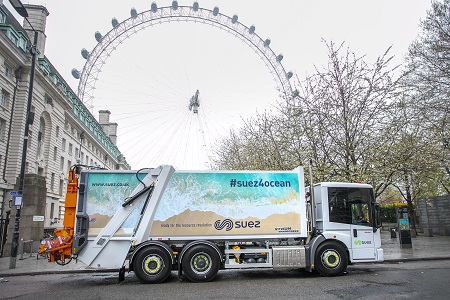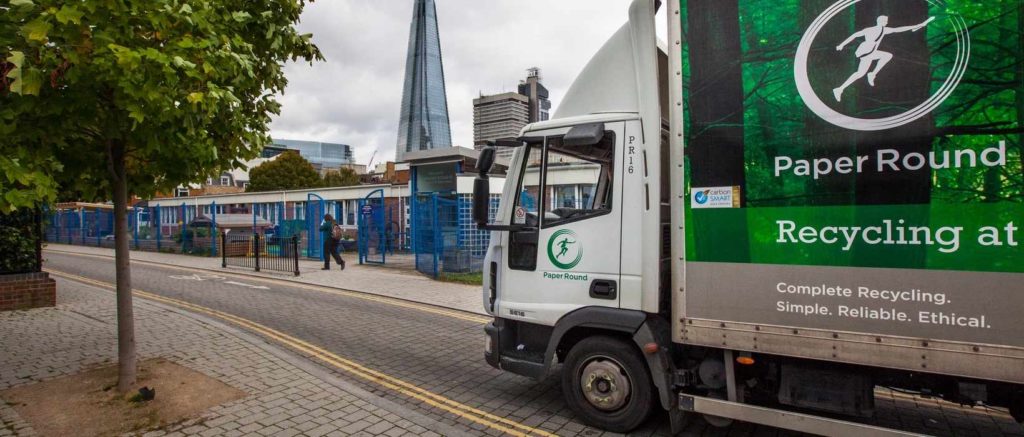The UK has now laboured under some form of Covid-19 restrictions for more than a year. In this special report James Langley looks at the pandemic’s impact on commercial waste in central London.
The commercial waste sector has been hit hard by the Covid-19 pandemic and this is especially true in London.
Commercial waste is any produced by a business on its premises and so is directly linked to the number of people going into the office. According to data from the Department for Transport, there were fewer than 5% of normal journeys on its network during the first lockdown, suggesting far fewer people were commuting.

A deserted Piccadilly Circus at the height of the first lockdown in April 2020 (picture: Shutterstock)
Other data from the ADEPT local authority officer group showed that in the week beginning 1 March 2021 as many as 67% of the authorities who responded to its survey reported a less-than-usual level of collected commercial waste (see letsrecycle.com story).
ReLondon, the organisation chaired by the Mayor of London and previously known as the London Waste and Recycling Board (LWARB), published a report in October 2020 on the impact of Covid-19 on commercial waste in London. Written by consultancy Eunomia, the report found that businesses which rely on trade from office workers, hotels of all sizes and gyms had seen the largest decline in business activity. Though the circumstances in which the report was written have changed since its release, not least with the publication of the government’s roadmap out of lockdown, it still provides a useful snapshot.
London’s local authorities and private waste contractors saw an initial drop of commercial waste volumes of between 60% and 90% in April 2020. As of the beginning of July 2020, local authority commercial waste tonnages increased, sitting 20% to 35% lower than at the same time in 2019. Private waste contractors briefly reported an increase in trade during July, stating that outdoor dining and the introduction of ‘Eat Out to Help Out’ had supported a recovery.
Lockdown
The most recent lockdown has put paid to that. A spokesperson for Westminster city council told letsrecycle.com: “Commercial waste volumes in Westminster have reduced by approximately 50% during the pandemic. Westminster city council has made a series of adjustments to its waste operations to reflect the reduced commercial activity. This has included diverting vehicles to provide additional collection services in residential areas of the city.”
City of London sources suggest many offices could re-open in mid-May. However, the Westminster spokesperson was pessimistic this could translate into higher volumes of commercial waste. “The council does not anticipate commercial volumes to immediately return to pre-Covid levels due to a number of factors, including some business closures, the likelihood of continued home-working, and reduced overseas visitor numbers.
“The growth in commercial activity will be closely monitored and waste services will be adjusted to meet the needs of businesses and residents.”
Trends
Every company that collects from central London, from small to large, has felt the impact. One major operator working in the capital is Suez. Stuart Hayward-Higham, the company’s technical development director, told letsrecycle.com Suez had monitored volumes of waste from the capital since the pandemic began.
He said: “During each lockdown the reduction in commercial waste has been particularly marked in city centres such as central London due to the mix of office, hospitality and retail businesses typically found in these locations. The wider south east region saw lower levels of activity across the board due to the prevalence of service-based industries.”
Mr Hayward-Higham said the various restrictions had led to changes in the composition of waste. “The composition of commercial waste is closely linked to the restrictions in place and levels of economic activity. We are collecting the same types of waste but in varying proportions. For example, currently hospitality businesses are mostly closed with the exception of takeaways, and offices are either closed or operating with limited staff, so we are seeing very different volumes and compositions coming through the system.”
Keith McGurk, managing director of waste management giant Veolia’s commercial division, echoed Mr Hayward-Higham’s points. “The hospitality sector is by far the biggest waste producer in central London, and the first lockdown obviously had a big impact in terms of waste volumes, particularly food waste and glass,” he said. “It has since recovered to about 35% of pre-Covid levels, and the expectation is that the stage changes advised for April, May and then the end of all restrictions in June for cafes, pubs, restaurants, hotels will see volumes increase significantly.”
Construction
Some sectors have proved more resilient than others. The volume of construction waste is said to have remained consistent throughout.
Jacqueline O’Donovan is managing director of London-based family-run O’Donovan Waste Disposal, which deals predominantly with construction and demolition waste. She told letsrecycle.com: “The waste type in our sector, construction and demolition, has not changed. We’re seeing more construction than demolition waste due to the pandemic and demo jobs not starting but other than that, our sector is fairly consistent.”
‘Reduction in footfall’
The big question is the viability of commercial waste collections in London once the pandemic ends. Luton-based family-run Cawleys serves businesses in north and east London. Phil Gudgeon, Cawleys’ managing director, told letsrecycle.com his company’s waste collections had fallen by 15% from September 2019 to September 2020. Being a ‘high fixed costs business’ and with reducing revenues, Cawleys had to make “a number of people” redundant.
A permanent switch to working from home could hit companies like his hard. “In London this could see a huge reduction in footfall with a significant impact on small business who rely on this as a revenue source,” said Mr Gudgeon. “I spoke to a customer of ours in London who saw his revenue reduce by 94%.”
However, he remains hopeful. “It’ll be interesting to see how many people return to the office given the number of people working from home and how well businesses have seen this work, ourselves included. After lockdown 1.0 we saw a gradual increase every week in collections.
“We’re in a flat spot at the moment. However, we did see an increase in the week ending 7 March, which I hope is businesses starting to prepare for unlock. People need to realise they can’t take any risks and have to abide by the rules laid out by government so that we can all get back to normality.”
Vaccine roll-out
Mr Gudgeon is not alone in his optimism. Paper Round carries out collections from offices of various sizes, retail, restaurants and hospitality, and the public sector in London and the south east. The business came into 2020 after a period of “high growth” and with a “strong balance sheet”, but still had to make use of the government’s furlough scheme to minimise redundancies.
Tom Mockridge, the company’s commercial director, told letsrecycle.com he believed the roll-out of vaccinations meant people would return to work in the city during the next few months.
“Looking at the current vaccine roll-out trajectories and plans to lift the lockdown, we expect to see a significant return to the office over the next two quarters,” he said. “The opening of hospitality will also affect the mix of materials being collected, with food and glass recycling recovering from their current very low levels.”
He too believes the commercial waste industry in London will recover. “We absolutely see commercial waste being a viable business after lockdown. However, we don’t expect a return to pre-Covid ‘business as usual’ ways. We believe the way employers use offices will change in some circumstances, for example offices becoming collaboration hubs. This will change the mix and volumes of waste and recycling. We also foresee a diverging need from clients, some very much ‘building back better’ and focusing on net zero.”
Hybrid model
Adaptation will be crucial to the commercial waste sector in future. Bradley Smith, sales and marketing director for Grundon Waste Management, told letsrecycle.com the pandemic had given companies the opportunity to review working practices and introduce changes to improve future services.
He said: “There’s no doubt it has been a challenging time for everyone, but it’s been something we have responded to by being as flexible as we can, proactively reaching out to customers to determine how we can best support them – both now and in the future as the lockdown is gradually lifted.”
Mr Smith said Grundon would work closely with the retail and hospitality sectors to help manage their waste collection demands needs as shops, hotels and restaurants start to open again.
“As businesses start to return towards more traditional working practices, I think we will see changes, most probably a more blended approach with employees spending some time in the office and some working at home. Our goal is to be very much part of the conversation around how best to adapt our services to their needs.”
This approach will be reflected throughout the industry. Mr Hayward-Higham said: “Looking ahead, we aren’t anticipating a mass return to office working, with many businesses discussing a hybrid model incorporating both office and home working that reimagines the role of the office as a space to collaborate and network as well as a place to work.
“City centres have always been dynamic and will adapt to the changing role of the office as we emerge from the pandemic. Our collection services will adapt in turn and will continue to evolve as we introduce new services when consistent collections are introduced from 2023, expanding the range of materials businesses recycle.”
The post Covid-19 hits London’s commercial waste sector appeared first on letsrecycle.com.
Source: letsrecycle.com Waste Managment










